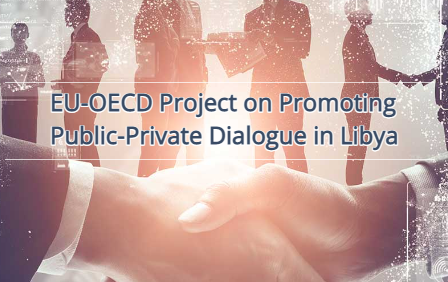 With the world bouncing back from the unprecedented COVID-19 health crisis, trending towards a greener recovery and calls from Libya’s youth for more inclusivity, the timing is ripe to work towards economic diversification in Libya. Since 2013, the OECD has been working on enhancing private sector development in Libya, including enhancing the legal framework for small and medium-sized enterprises. Under this new ambitious project launched in 2020, the EU and the OECD will support public-private dialogue in Libya through the creation of a dedicated platform, capacity-building and the provision of technical expertise to move towards this new economic vision.
With the world bouncing back from the unprecedented COVID-19 health crisis, trending towards a greener recovery and calls from Libya’s youth for more inclusivity, the timing is ripe to work towards economic diversification in Libya. Since 2013, the OECD has been working on enhancing private sector development in Libya, including enhancing the legal framework for small and medium-sized enterprises. Under this new ambitious project launched in 2020, the EU and the OECD will support public-private dialogue in Libya through the creation of a dedicated platform, capacity-building and the provision of technical expertise to move towards this new economic vision.
Objectives of the Programme
Promoting Public-Private Dialogue in Libya is an EU-OECD Programme that supports and encourages an active economic and social dialogue between Libya’s public and private actors. Through public-private dialogue, the Programme will contribute to the adoption of the necessary economic transformation policies that can lead to post-conflict recovery and the diversification of Libya’s economy. The Programme will work towards its objectives by:
► Creating a platform which mobilises public-private discussions through physical encounters;
► Providing the government, private and social actors with the tools and expertise necessary to engage in a structured dialogue;
► Contributing to developing a new economic vision for the country, delivering analytical inputs and well-structured and specific policy reform plans.
Contact us
Learn more about the EU-OECD Programme, the events that we host and participate in, and contact us with your questions: MENA.competitiveness@oecd.org
Access the Knowledge Platform
What is Public-Private Dialogue?
Public-Private Dialogue (PPD) is a tool to create effective and transparent reform coalitions to inform the design and implementation of policies while building trust between economic actors. For Libya's economic diversification to be a success the journey must be based on a collaborative dialogue between the government, the business community and civil society, backed by a supportive legal system and the necessary infrastructure. Promoting Public-Private Dialogue in Libya aims to provide a structured, sustainable and well-informed platform for the mobilisation of public and private actors. Building institutional frameworks in which the private sector can participate and effectively contribute to the decision-making process is essential for producing better policy outcomes.
Related OECD Activities
- The MENA-OECD Business Advisory Board is a region-wide platform which promotes PPD and fosters a peer knowledge-sharing approach.
- The EU-OECD Programme on Promoting Economic Resilience in Yemen aims to strengthen Yemen’s socio-economic resilience to create conditions for viable economic institutions, a strong component of which is PPD.
- The MENA-OECD Economic Resilience Task Force promotes economic resilience of fragile and conflict-affected economies of the MENA region.
- The Observatory of Public Sector Innovation works with countries that are transforming their operations and improving the lives of their people through innovation.

SMEs in Libya's Reconstruction: Preparing for a Post-Conflict Economy
The report is intended to contribute to the implementation of policies in a post-conflict Libya to promote private sector development. Based on international experience and practices, and considering the context of the country, the report identifies the necessary legal frameworks, institutions and policies for the promotion of SME and entrepreneurship. The document is part of a wider MENA Transition Fund project to support the design and implementation of SME policies in Libya.
@Clara/Shutterstock.com
READ THE REPORT



